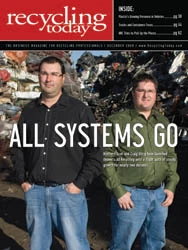All for One and One for All
Speakers at the recently concluded Bureau of International Recycling (BIR) Autumn Round-Table Sessions called for recyclers to stay on the same page in regard to defining what recyclables are.
In a presentation held during the event, Olivier François, chairman of the BIR International Environment Council and an executive with Belgium-based Galloometal, called for the recycling industry to stick together as it sought to achieve its goal of separating its material from waste legislation.
Currently under discussion, criteria for establishing the “end of waste” would bring welcome harmonization and legal certainty for the entire EU recycling industry, while also reducing the industry’s administrative burden, François said. It was “very important,” therefore, for recyclers to support the final push toward defining the “end of waste” for the various recyclables, he said. “We really must keep this target in mind. We need to be strong and we need to be strong together.”
Further developments on the criteria for ferrous and aluminum scrap were anticipated before the end of this year, he added.
Also discussed during the International Environment Council meeting was the work being done with the OECD (Organization for Economic Cooperation and Development) in regard to sustainable materials management (SMM). BIR Environmental and Technical Director Ross Bartley confirmed that the OECD is advancing with its work on SMM, with case studies developed on aluminum, plastics, fiber and other materials. In looking at a more integrated life-cycle approach, SMM intends to ensure that material resources are managed sustainably and used efficiently throughout their life cycles to help promote economic growth, environmental quality and sustainable development.
While SMM should be “good for recycling,” Bartley said, he also expressed concern at “elements of protectionism” contained within the related documentation.
Bartley also called for recyclers to participate in the Basel Convention’s Partnership for Action on Computing Equipment. Established in January 2009, this partnership brings together personal computer manufacturers, refurbishers, recyclers, international organizations, academia, environmental groups and governments in a bid to improve the management of used and end-of-life computing equipment. Its project groups will cover environmentally sound management criteria; refurbishment and repair; material recycling and recovery; and awareness-raising and training.
Two guest speakers also addressed attendees during the International Environmental Council meeting. Frans Bijlhouwer of the Dutch firm Quality Consultants spoke of the importance of quality management systems such as ISO 9001. More suppliers, customers and government agencies are asking for certification of this kind; therefore, companies going down this route were improving their competitive position both in domestic and world markets, he said. In addition, adoption of a quality management system served to improve business performance and to boost confidence in a company, he said. Manuel Villena of LoadIt, a Dutch venture, discussed moving toward creating “paperless administration” of scrap shipments using information technology. Already approved in the Netherlands, the system has saved a sample Dutch company about 260 hours in a single month, he said.
The BIR Autumn Round-Table Sessions took place Oct. 26-27 at the Hotel Okura in Amsterdam. More information on the BIR is available at www.bir.org.

Explore the December 2009 Issue
Check out more from this issue and find your next story to read.
Latest from Recycling Today
- Aqua Metals secures $1.5M loan, reports operational strides
- AF&PA urges veto of NY bill
- Aluminum Association includes recycling among 2025 policy priorities
- AISI applauds waterways spending bill
- Lux Research questions hydrogen’s transportation role
- Sonoco selling thermoformed, flexible packaging business to Toppan for $1.8B
- ReMA offers Superfund informational reports
- Hyster-Yale commits to US production





